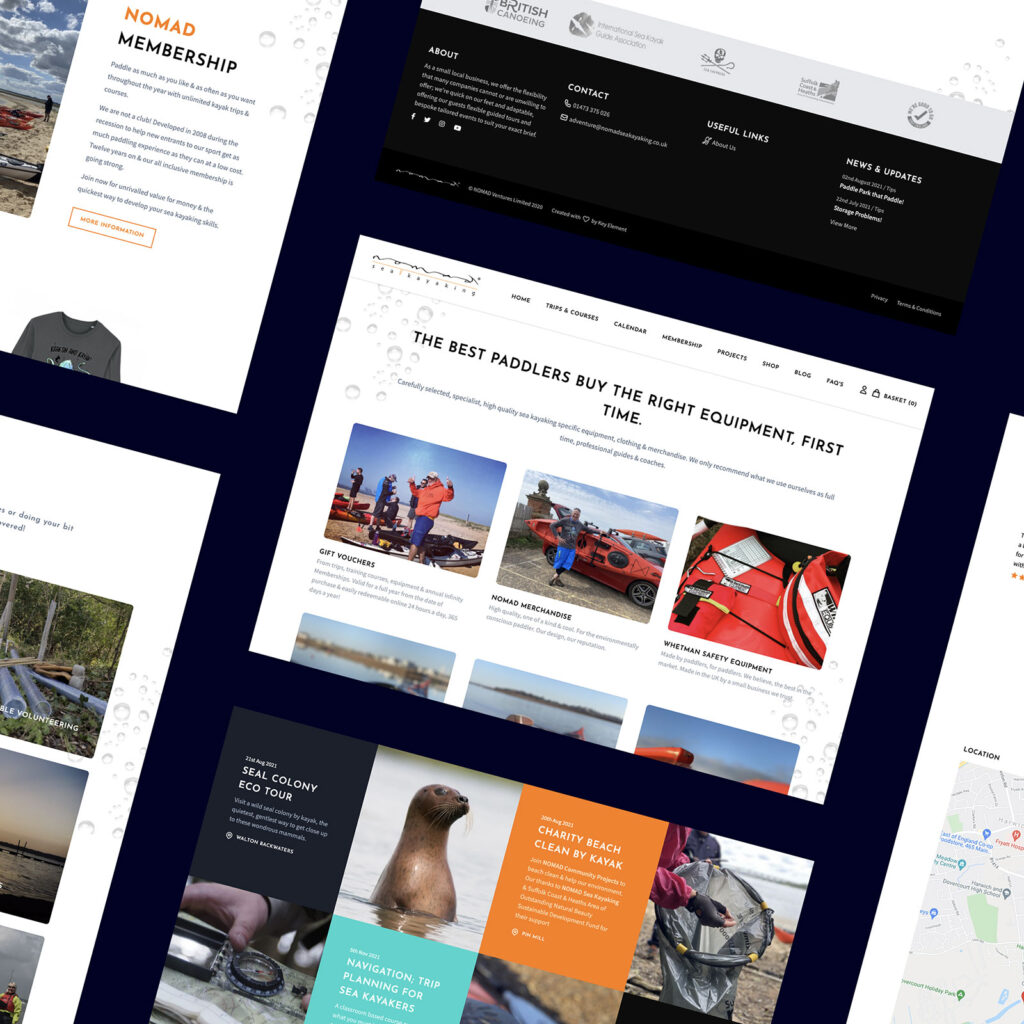
Why Content is Your Most Valuable Digital Asset (and How to Get the Most From It)
Sit down with a marketing professional and ask them to explain the mechanics of brand building online, and you could well be in for a long answer.
That’s because digital marketing is a complex and sophisticated business. To get it right, by which we usually mean, help a business to make money, you have to know your stuff. The skill sets involved in modern-day branding and marketing span the creative arts, cutting-edge technological know-how and rigorous data-led methods.
That all said, if you really want to distil digital marketing down into its bare essence, it can be summed up in just one word – engagement. People often discuss the importance of online visibility, enabling them to be seen amidst the digital crowd or driving traffic to websites and other channels.
That’s all true. But what matters in digital marketing, once someone has seen your brand and been tempted to visit your site, is engaging them. Giving them something that makes them think, I like this place, I’ll hang around a while. I’ll come back again. I’ll tell my friends. I’ll buy something.
So, what gets people engaged in your website or your blog, your social channels or your podcast? That’s where content comes in. All of the ‘stuff’, be it in the form of text, images, video, audio, etc, that populates your sites and your feeds, that you post and send, and that you hope your audience shares and likes – that’s content.
There are now whole sub-fields of digital marketing known as engagement marketing and content marketing that are dedicated to the strategic, planned use of content to maximise visibility, engagement and all those other good things that lead to a thriving online brand. But we don’t believe content should be treated as a specialism or a niche in marketing. It’s core to everything you do to build a brand. In fact, we’d go even further than that. So critical has content become to online success, we’d argue that it is the single most important asset you have in delivering a successful digital marketing strategy.

What do the numbers say?
We’re not the only ones. Roughly three-quarters (72%) of digital marketers report that taking a strategic approach to content improves engagement rates. 88% say they have had success creating awareness, as well as building trust and credibility in their brand, through their use of content. This translates into businesses that embrace taking a strategic approach to content marketing enjoying 6x better returns than those that don’t.
You can see the value of content behind many telling stats about success on various marketing channels. 81% of consumers say they make spontaneous purchases because of something they have seen on social media. And 35% put that down to ‘liking the look of the post’ – the third biggest driver of purchasing decisions on social media behind discounts and promotions, and going on to specifically shop for a product. There you have the quality of how your content ‘looks’ (which we can read as a combination of design and relevance) directly influences sales.
We can see a similar story with blogs. Businesses that run a blog enjoy average lead growth of 165%, which is more than double what businesses that don’t have a blog get. According to Hubspot, individual creator-entrepreneurs are 13x more likely to get positive returns from running a blog versus not.
So, how do you maximise the value you get from content? As we’ve already said, it starts with a strategic approach. You can get a flavour of the strategic approach we take at Key Element as content marketers from this case study outlining our work with accountancy firm Deciphr, or from the content strategy we implemented with Novello Chartered Surveyors Ltd.
Content marketing is also a fast-paced, dynamic field, with technology and consumer tastes driving rapid change. With that in mind, keeping pace with the latest trends pays dividends. Here are three that can make all the difference in maximising content value going forward.

Embrace ‘Deep’ Personalisation
Consumers have always wanted content that speaks to their interests, needs and emotions. Increasingly, they are expecting content that speaks to them on a more direct and personal level, too – that is, content tailored to them as individuals, like the bartender who remembers your name and favourite drink. Whether it’s tailored product recommendations, dynamic website content, or content delivery across chosen channels triggered by user actions, personalisation enhances engagement by making content feel more relevant than ever.
This kind of ‘deep’ or ‘hyper’ personalisation has been found to contribute to a 10% uptick in sales and an 80% increase in marketing ROI. But it isn’t easy. To keep on delivering the right message to the right person at the right time, you need to have your data gathering and utilisation on point. And you need capacity and efficiency in your content creation processes to be able to keep churning out endless personalised variations in content. AI is making this possible. But as we’ll see next, there’s a degree of caution required in how you use AI in content marketing.
Leverage User-Generated Content (UGC)
If you’re talking authenticity and trust, consumers tend to trust nothing more than the opinions of other consumers. They know the game. Brands will tell them anything to convince them to buy. But other people, that’s where you get the truth from.
This has fuelled the elevation of user-generated content (UGC) right to the very top of the content marketer’s priority list. User reviews, surveys, polls, conversational threads on social media, viral campaigns where you encourage followers to submit their own stories, photos and video clips under theme #whatever – these are all ways for businesses to leverage the popularity of UGC. It also has the added benefit of offloading the content creation work to someone else!
Does it work? As of 2025, nearly two-thirds (60%) of consumers view UGC as more authentic than any other form of content. Interestingly, 86% of consumers now trust UGC more than influencer-led marketing, too. And one study in 2024 found that 9 out of 10 people consider UGC to be the most influential purchase driver, while three-quarters said UGC increases their purchasing confidence.
Looking to get more from your content? Key Element can support you with all aspects of digital strategy and planning, helping you to see where content fits in delivering against your business goals as well as meeting the needs of your customers. Get in touch to find out more.
Blend AI with Personality
There’s huge value in personalising brand content to meet your audience at an individual level. But there’s equal value in ensuring your content has personality, too. And for that, what we’re really talking about is keeping the human touch.
When generative AI burst onto the world with the launch of ChatGPT in 2022, marketers quickly saw its potential – you mean there’s now a tool that can write all this stuff for us, at the touch of a button? And generate images and even videos, too?
AI has a big role to play in the future of content marketing, not least for helping with the kind of scalability required to deliver deep personalisation. But brands need to be careful they don’t lean on AI so much that their content becomes robotic. People can tell the difference. The more AI intrudes on our digital experiences, the more people are looking for authenticity and connection.
This can be seen in the growth of influencer marketing and the way that ‘people not brands’ tend to command loyalty these days. In content marketing, one on-trend acronym for how to boost and maintain engagement with audiences is to focus on building E-E-A-T into your work – experience, expertise, authoritativeness and trustworthiness.
AI can help by freeing up marketers and creative teams to focus on effective brand storytelling and engagement, especially in relation to the deep analytics required to develop agile, successful digital strategies, and supporting workflows with intelligent automation. It’s all about getting the right balance.
Frequently Asked Questions
What is content marketing, and how is it different from traditional marketing?
Content marketing focuses on the creation and distribution of content as a means of attracting and engaging a target audience. By ‘content’, we mean anything that you can publish or share online – text, images, videos, blogs, newsletters, social posts, infographics, podcasts. papers and reports etc. Unlike traditional marketing, which pushes direct sales messages, content marketing aims to build relationships by offering useful information, entertainment, or insight. In that sense, it borrows heavily from media in all its forms. By building trust and loyalty, the aim is ultimately to drive conversions and lock in repeat business, but by taking a less direct route that avoids all interactions with customers feeling like a sales pitch.
How does content help grow my business?
High-quality content improves visibility in search engines, attracts organic traffic, encourages people to engage and share what you are putting out on social media, nurtures leads, and converts customers. It also supports brand credibility and customer retention. Data shows businesses that blog get over 160% more leads than those that don’t, and strategic content marketing can deliver up to six times better ROI.
What types of content are most effective right now?
Consumers favour formats that are quick to consume, authentic, and tailored to their interests. Most content marketers agree that short-form video for use on social platforms like Instagram and TikTok is highly effective for engaging audiences, particularly amongst younger demographics. User-generated content (UGC) in the form of customer reviews, surveys, polls and interactive social campaigns are also very popular with consumers as it carries an air of authenticity that people trust. Personalisation also makes content more relevant to individual users.
How can small businesses keep up with content demands?
Efficiency is key. Tools powered by AI can streamline planning, analytics, and some content production, freeing up time for strategy and creativity. Repurposing content across channels, encouraging user contributions, and focusing on a few high-impact formats can also help maintain output without overstretching resources.
Is it okay to use AI to write or design content?
Yes – but the key is not to over-use it. AI is a powerful support tool for ideation, data analysis, and creation. But people crave personality and authenticity in content. Leaving AI to take on the bulk of the production work can lead to content that is sterile and lacking personality. Use AI to enhance productivity and gain insights but always add a human touch to ensure your content resonates, feels real, and aligns with your brand’s voice.
Services you may be interested in

Web Development Services
We specialise in crafting bespoke, user-experience (UX) optimised sites. We are a dedicated team of web designers committed to elevating your brand to new heights

SEO Services
We specialise in catapulting businesses to the forefront of digital visibility, ensuring they not only compete but dominate in their respective markets.
